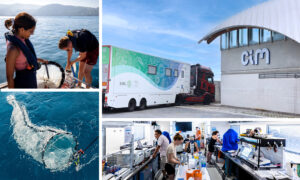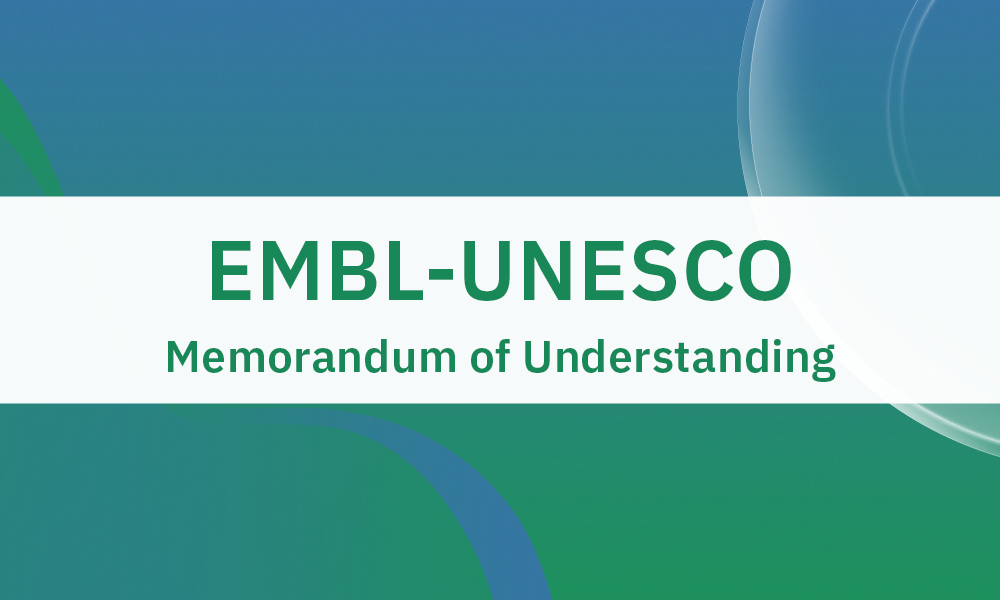
EMBL partners with UNESCO to drive progress on shared goals
New agreement with UN organisation will enable cooperation in the fields of open science, capacity building, and talent development

At the heart of EMBL’s objectives is a long-term commitment to pushing the boundaries of fundamental research. Through its work towards goals like the strategic coordination of life science research, and the training of scientists at all stages of their careers, EMBL aims to support projects that open the door to researchers from a wider range of backgrounds, and to foster science for sustainable development.
Now, in a move that lays the foundation for a range of projects that support these and a number of other overarching aims, EMBL has signed a memorandum of understanding with UNESCO. This new agreement opens the door to greater collaboration in the areas of open science; capacity building in developing countries, particularly in Africa; the sharing of key resources; and the promotion of greater gender equality in science.
Speaking about the importance of such collaborations, EMBL’s Head of International Relations, Plamena Markova said, “The best research follows the principles of open science, and is conducted in a spirit that enables researchers from a diverse range of backgrounds to contribute and benefit. These principles have always been at the heart of EMBL. We are looking forward to seeing the fruits of our cooperation with UNESCO in the coming years.”
Deep international cooperation
UNESCO is the United Nations Educational, Scientific and Cultural Organisation. It aims to contribute to peace and security, through the promotion of international cooperation in education, sciences, culture, communication and information. UNESCO works with science organisations to share ideas and establish standards, promote dialogue between scientists and policy makers, and enable the development of deeper international cooperation in science.
Speaking following the signing of the agreement, UNESCO Assistant Director General for Natural Sciences Shamila Nair-Bedouelle, commented, “UNESCO looks forward to collaborating with the European Molecular Biology Laboratory in implementing the UNESCO Recommendation on Open Science. UNESCO can assist EMBL in enhancing its collaboration with scientists and scientific institutions in primarily developing countries, in order to raise their awareness of EMBL’s data-sharing platforms and accessible research and support services related to COVID-19 and many other areas.”
Concrete actions
Commenting on the timing of the agreement, Plamena Markova added that it “comes at a particularly exciting time for EMBL and the life sciences in general. EMBL’s ‘Molecules to Ecosystems’ programme is now fully underway, and many of its themes are at the top of the agenda for researchers and policymakers alike. The benefits coming from research discoveries and the related science policies should be shared widely across countries and continents.”
The commitment to shared action will move up a gear in 2023, with EMBL and UNESCO working on a pilot ‘visitor programme’ that will enable researchers to be hosted at EMBL sites. This pilot project will initially accommodate up to three female researchers, who will be able to spend up to six months at an EMBL site. Potential visitors will initially be drawn from recipients of the L’Oréal-UNESCO for Women in Science Award, and from the network of researchers engaged in UNESCO’s ‘For Women in Science‘ and its ‘Organisation for Women in Science for the Developing World‘ initiative.
The successful candidates for this pilot project will be welcomed into EMBL’s Infection Biology Transversal Theme. The Transversal Themes (TT) form a key pillar within the current EMBL Programme, ‘Molecules to Ecosystems‘, and the Infection Biology TT aims to contribute to vital research on the biology and mechanisms of infection, as well as on diagnostic and treatment of infectious disease. EMBL is using its unique capacities in imaging and structural biology in orders to conduct this research, and the visitors will gain an incredible insight into this cutting-edge work during their stay.
Further information about the pilot project will be available shortly.


